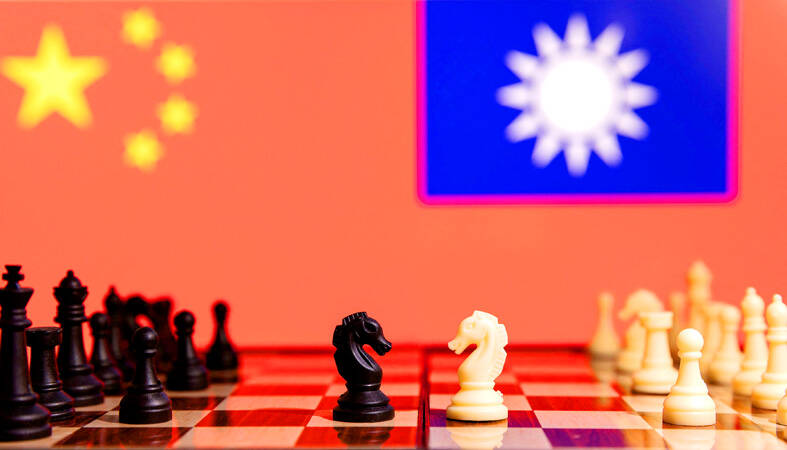China is likely to continue using economic and cyberoperations against Taiwan to force it to capitulate without resorting to a military attack, Fox News reported yesterday, citing the outcome of a tabletop exercise.
Washington-based think tank the Foundation for Defense of Democracies (FDD) earlier this month held a tabletop exercise in Taipei focusing on Beijing’s use of economic and cybercoercion against Taiwan.
The FDD mentioned an “anaconda strategy,” in which Beijing would likely use cyberwarfare and disinformation campaigns followed by a blockade or other measures to strangulate Taiwan, rather than attempting an invasion, the report said.

Photo: Reuters
A large-scale cyberattack would be far costlier to defend against than to launch, thereby giving China the advantage, it said.
“This asymmetry allows China to exert considerable pressure on Taiwan without triggering a direct US military response,” it said, adding that China would use covert cyberwarfare operations that provide it with “just enough cover to maintain plausible deniability.”
Former US Navy rear admiral Mark Montgomery, senior director of the FDD’s Center on Cyber and Technology Innovation, said in an online interview Taiwan faces severe challenges in sustaining its economy in the event of an attack on its critical infrastructure by China.
“How do you keep things going during a series of interlaced critical infrastructure failures, where electrical power drives a problem with financial services, things like that?” he asked.
In addition to cyberattacks, China might also attempt to affect the morale of Taiwanese by spreading misinformation, the report suggested.
In the report, researcher Dean Karalekas said that while Russia’s invasion of Ukraine has spurred preparation in Taiwan, that preparation might not be particularly useful.
Rather than kinetic warfare such as the one in Ukraine, Taiwan was more likely to face being cut off from its supplies of energy, food and other imports, he said.
The FDD said that Taiwan’s reserve troops are poorly trained and lack sufficient equipment to effectively support the regular army in wartime.
Taiwan is also highly dependent on imported liquefied natural gas and has limited energy reserves, it said.
“Once key routes are blocked, it may fall into an energy shortage crisis, and although Taiwan actively develops green energy such as wind power generation, these facilities can easily become targets of enemy attacks during wartime, making it difficult to provide a stable power supply,” it said.
The team recommended that Taiwan actively demonstrate to the international community its determination to defend itself and resolve through specific actions, including increasing its defense budget, strengthening reserve force training and diversifying energy sources.

Taiwan has received more than US$70 million in royalties as of the end of last year from developing the F-16V jet as countries worldwide purchase or upgrade to this popular model, government and military officials said on Saturday. Taiwan funded the development of the F-16V jet and ended up the sole investor as other countries withdrew from the program. Now the F-16V is increasingly popular and countries must pay Taiwan a percentage in royalties when they purchase new F-16V aircraft or upgrade older F-16 models. The next five years are expected to be the peak for these royalties, with Taiwan potentially earning

STAY IN YOUR LANE: As the US and Israel attack Iran, the ministry has warned China not to overstep by including Taiwanese citizens in its evacuation orders The Ministry of Foreign Affairs (MOFA) yesterday rebuked a statement by China’s embassy in Israel that it would evacuate Taiwanese holders of Chinese travel documents from Israel amid the latter’s escalating conflict with Iran. Tensions have risen across the Middle East in the wake of US and Israeli airstrikes on Iran beginning Saturday. China subsequently issued an evacuation notice for its citizens. In a news release, the Chinese embassy in Israel said holders of “Taiwan compatriot permits (台胞證)” issued to Taiwanese nationals by Chinese authorities for travel to China — could register for evacuation to Egypt. In Taipei, the ministry yesterday said Taiwan

‘LIKE-MINDED PARTNER’: Tako van Popta said it would be inappropriate to delay signing the deal with Taiwan because of China, adding he would promote the issue Canadian senators have stressed Taiwan’s importance for international trade and expressed enthusiasm for ensuring the Taiwan-Canada trade cooperation framework agreement is implemented this year. Representative to Canada Harry Tseng (曾厚仁) in an interview with the Central News Agency (CNA) said he was increasingly uneasy about Ottawa’s delays in signing the agreement, especially as Ottawa has warmed toward Beijing. There are “no negotiations left. Not only [is it] initialed, we have three versions of the text ready: English, French and Mandarin,” Tseng said. “That tells you how close we are to the final signature.” Tseng said that he hoped Canadian Prime Minister Mark Carney

POSITIVE DEVELOPMENT: Japan and the US are expected to hold in-depth discussions on Taiwan-related issues during the meeting next month, Japanese sources said The holding of a Japan-US leaders’ meeting ahead of US President Donald Trump’s visit to China is positive news for Taiwan, former Japan-Taiwan Exchange Association representative Hiroyasu Izumi said yesterday. After the Liberal Democratic Party’s landslide victory in Japan’s House of Representatives election, Japanese Prime Minister Sanae Takaichi is scheduled to visit the US next month, where she is to meet with Trump ahead of the US president’s planned visit to China from March 31 to April 2 for a meeting with Chinese President Xi Jinping (習近平). Japan and the US are expected to hold in-depth discussions on Taiwan-related issues during the